 In a 147-page ruling [PDF] released Thursday evening, "after hearing and carefully considering all the evidence" presented in the trial which ended on September 22nd, a U.S. District Court in Texas has found that the state's polling place Photo ID law, SB 14, is discriminatory and violates the U.S. Constitution in at least four different ways.
In a 147-page ruling [PDF] released Thursday evening, "after hearing and carefully considering all the evidence" presented in the trial which ended on September 22nd, a U.S. District Court in Texas has found that the state's polling place Photo ID law, SB 14, is discriminatory and violates the U.S. Constitution in at least four different ways.
"The Court holds that SB 14 creates an unconstitutional burden on the right to vote, has an impermissible discriminatory effect against Hispanics and African-Americans, and was imposed with an unconstitutional discriminatory purpose," U.S. District Court Judge Nelva Gonzales Ramos writes in her ruling. "The Court further holds that SB 14 constitutes an unconstitutional poll tax."
The ruling that now permanently enjoins the Texas law, again, follows a long string of federal rulings striking down Photo ID voting restrictions in the state under Section 5 of the federal Voting Rights Act. In 2012, both the Dept. of Justice and a three-judge panel of federal judges found the law to be discriminatory under the Act, and that, based on data supplied by the state themselves, it would serve to disproportionately disenfranchise both poor and minority voters.
The very same law was once again implemented, however, by Lone Star State Republicans just after the U.S. Supreme Court gutted Section 5 of the VRA last year. The current challenge to the law was brought under Section 2 of the Act, as well as the U.S. Constitution itself. Judge Gonzales Ramos found that the discrimination found by previous bodies was plainly still present in the law...
'Penchant for discrimination in Texas'
Citing the state's long history of discrimination in voting laws, from the late 1800s right on up to 2014, Gonzales Ramos writes: "This history describes not only a penchant for discrimination in Texas with respect to voting, but it exhibits a recalcitrance that has persisted over generations despite the repeated intervention of the federal government and its courts on behalf of minority citizens."
"In each instance, the Texas Legislature relied on the justification that its discriminatory measures were necessary to combat voter fraud," the judge explained. "There has been a clear and disturbing pattern of discrimination in the name of combating voter fraud in Texas. In this case, the Texas Legislature's primary justification for passing SB 14 was to combat voter fraud. The only voter fraud addressed by SB 14 is voter impersonation fraud, which the evidence demonstrates is very rare."
Indeed, a recent study of polling place impersonation fraud across the country over the past 14 years found that, out of more than 1 billion votes cast nationally, there are just 34 known cases of possible polling place impersonation that might have been deterred by strict polling place Photo ID restrictions akin to the one enacted by TX Republicans. That survey confirmed an earlier study by a non-partisan news consortium examining every reported case of election-related fraud in all 50 states between 2000 and 2012. That study was able to identify just 10 officially reported instances of in-person voting fraud that might have been blocked by polling place Photo ID restrictions.
"In the ten years preceding SB 14" in Texas, Gonzales Ramos writes, "only two cases of in-person voter impersonation fraud were prosecuted to a conviction --- a period of time in which 20 million votes were cast." She explains that "the testimony of several experts who are abundantly familiar with the nature of in-person voter impersonation fraud and election history" made clear during the trial that "While there have always been allegations of in-person voter impersonation fraud, the reality is that the allegations are seldom substantiated."
'Strictest in the country'
The Judge went on to describe the TX law as "comparatively the strictest in the country," as it, for example, allows the use of concealed-carry weapons permits for voting identification purposes, but not student IDs issued by state universities.
"SB 14 was the Texas Legislature's fourth attempt to enact a voter photo ID law. Over time, the provisions became increasingly strict and the procedural mechanisms engaged to ensure passage became more aggressive."
Indeed, as the court explains, the Republican state legislature even changed their procedures, "solely for voter ID legislation", to pass the statute on an "emergency basis" "without meaningful debate" in order to keep it from being blocked by Democrats who had long opposed it. They cited the millions of eligible voters, largely minority, elderly and students (who tend to vote Democratic) who were likely to be disenfranchised. Democrats cited, for instance, the 250-mile round-trip drive that some voters would have to accomplish (without drivers licenses!) in order to obtain their so-called "free" Election Identity Card (EIC) made available by the state for the purposes of voting.
Such legally registered voters would also need to own or obtain the underlying documents necessary to receive an EIC, the cost of which, Gonzales Ramos determined, amounts to an unconstitutional poll tax.
"Plaintiffs have thus demonstrated that every form of SB 14-qualified ID available to the general public is issued at a cost." And for voters without appropriate SB 14 ID, they can only obtain a free EIC with documents such as a birth certificate that they would be forced to pay for themselves, simply in order to receive their "free" ID in order to cast their legal vote under the law.
Writing at The American Prospect, Wendy R. Weiser, director of the Democracy Program at the Brennan Center for Justice at NYU Law School, summarized some of the "uncontroverted expert data presented" during the TX trial. Those data detailed just how many voters were likely to be adversely affected by the law, and from which types of backgrounds those voters come:
"As of September", Weiser writes, despite this version of the law having been enacted in 2011, struck down, and then implemented again in 2013 after SCOTUS gutted the key provision of the Voting Rights Act that had repeatedly blocked it, "Texas had issued only 279 free IDs, and had done virtually no voter education."
'Bail-in'?
Remaining questions, in addition to whether or not this ruling will be allowed to stand or be overturned by a higher court, include whether or not Texas will once again be required to receive federal preclearance for changes to voting laws. While preclearance has stopped for all jurisdictions, as of now, thanks to the Supreme Court's ruling on the Voting Rights Act last year, Section 3 of the Act allows jurisdictions who purposely discriminate to be "bailed in" to preclearance coverage. The case ruled on today included a demand to add Texas to the preclearance list under Section 3 and, according to Gonzales Ramos, found enough intentional discrimination to trigger that provision.
"The court expressly finds intentional discrimination relevant to bail-in under the Voting Rights Act," notes election law expert Justin Levitt, "and says it will consider a bail-in order in the days to come. If the court indeed follows up with a bail-in order, Texas could become the first state brought back under a preclearance regime since" the SCOTUS' Voting Rights Act decision last year in Shelby County, AL v. Eric Holder.
With her ruling today, Judge Gonzales Ramos has placed "a permanent and final injunction against enforcement of the voter identification provisions" in the state of Texas.
Of course, U.S. District Court Judge Lynn Adelman similarly placed a permanent injunction on Wisconsin's Republican Photo ID voting rule after a lengthy trial and a meticulously written ruling, only to see it overturned by three GOP-appointed judges at the 7th Circuit Court of Appeals. That ruling, made just weeks prior to this November's election, was based on wildly inaccurate assertions by the court.
However, as this article goes to press, we have now learned that the emergency appeal filed by the ACLU with the U.S. Supreme Court to block the Badger State Republican's version of a Photo ID voting law has been approved by a vote of 6 to 3 at the High Court. So, perhaps, there is hope that even the inevitable appeals to the Texas law by state Republicans will be held off by the U.S. Supreme Court as well, at least in advance of the upcoming 2014 mid-term elections.
UPDATE 10/14/2014: A 3-judge panel on the 5th Circuit Court of Appeals stays Judge Gonzales Ramos' ruling. TX GOP 'discriminatory' and 'unconstitutional' Photo ID voting restriction is back in effect for November, as of now. Plaintiff's vow to appeal to U.S. Supreme Court. Full details now here...
UPDATE 10/18/2014: Despite the U.S. District Court's uncontested findings that the TX Photo ID law is deliberately discriminatory and an "unconstitutional poll tax", the U.S. Supreme Court will allow its use in this year's midterm elections anyway. Full details now here...
(Snail mail support to "Brad Friedman, 7095 Hollywood Blvd., #594 Los Angeles, CA 90028" always welcome too!)
|


 FEC Repubs Vote to Allow Campaign Donor Anonymity: 'BradCast' 5/16/24
FEC Repubs Vote to Allow Campaign Donor Anonymity: 'BradCast' 5/16/24 'Green News Report' 5/16/24
'Green News Report' 5/16/24
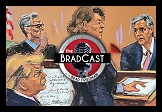 Trump Trial Ketchup: Cohen, a 'Smoking Gun', and 'The Cult of Trump': 'BradCast' 5/15/24
Trump Trial Ketchup: Cohen, a 'Smoking Gun', and 'The Cult of Trump': 'BradCast' 5/15/24 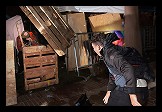 LAPD Right-Wing Bias in Violent Response to UCLA Protest Was No Surprise
LAPD Right-Wing Bias in Violent Response to UCLA Protest Was No Surprise Could Ohio Repubs REALLY Keep Biden Off the Ballot?!: 'BradCast' 5/14/24
Could Ohio Repubs REALLY Keep Biden Off the Ballot?!: 'BradCast' 5/14/24 'Green News Report' 5/14/24
'Green News Report' 5/14/24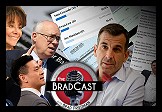 Recount in Tied U.S. House Primary Highlights Probs in CA Law: 'BradCast' 5/13/24
Recount in Tied U.S. House Primary Highlights Probs in CA Law: 'BradCast' 5/13/24 Sunday 'Stormy Weather Continues' Toons
Sunday 'Stormy Weather Continues' Toons Facing Down the Threat to American Democracy: 'BradCast' 5/9/24
Facing Down the Threat to American Democracy: 'BradCast' 5/9/24 'Green News Report' 5/9/24
'Green News Report' 5/9/24 Trump Trial Ketchup:
Trump Trial Ketchup: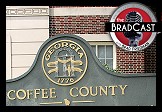 New Cybersecurity Breach in Coffee County, GA: 'BradCast' 5/7/24
New Cybersecurity Breach in Coffee County, GA: 'BradCast' 5/7/24 'Green News Report' 5/7/24
'Green News Report' 5/7/24 2024 Electoral -- and Climate -- Omens: 'BradCast' 5/6/24
2024 Electoral -- and Climate -- Omens: 'BradCast' 5/6/24 Sunday 'Self Reflecting' Toons
Sunday 'Self Reflecting' Toons 'Green News Report' 5/2/24
'Green News Report' 5/2/24 Pro-Palestine Protests, Proportionality, and Political Perspective: 'BradCast' 5/2/24
Pro-Palestine Protests, Proportionality, and Political Perspective: 'BradCast' 5/2/24 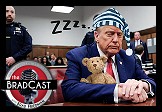 Trump Trial Ketchup: Criminal Contempt and His Two-Tier Justice: 'BradCast' 5/1/24
Trump Trial Ketchup: Criminal Contempt and His Two-Tier Justice: 'BradCast' 5/1/24 CANNING: Third-Party Myopia v.
CANNING: Third-Party Myopia v. A Few Hits of Dopamine for Your Listening Pleasure: 'BradCast' 4/30/24
A Few Hits of Dopamine for Your Listening Pleasure: 'BradCast' 4/30/24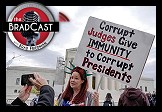 SCOTUS Corruption on Full Display at Trump 'Immunity' Hearing: 'BradCast' 4/29/24
SCOTUS Corruption on Full Display at Trump 'Immunity' Hearing: 'BradCast' 4/29/24 Trump's Ridiculous 'Immunity' Case Heard by Corrupted SCOTUS: 'BradCast' 4/25/24
Trump's Ridiculous 'Immunity' Case Heard by Corrupted SCOTUS: 'BradCast' 4/25/24 NY Trump Trial Mid-Week Ketchup: 'BradCast' 4/24/24
NY Trump Trial Mid-Week Ketchup: 'BradCast' 4/24/24 'Election Fraud, Pure and Simple': 'BradCast' 4/23/24
'Election Fraud, Pure and Simple': 'BradCast' 4/23/24
 VA GOP VOTER REG FRAUDSTER OFF HOOK
VA GOP VOTER REG FRAUDSTER OFF HOOK Criminal GOP Voter Registration Fraud Probe Expanding in VA
Criminal GOP Voter Registration Fraud Probe Expanding in VA DOJ PROBE SOUGHT AFTER VA ARREST
DOJ PROBE SOUGHT AFTER VA ARREST Arrest in VA: GOP Voter Reg Scandal Widens
Arrest in VA: GOP Voter Reg Scandal Widens ALL TOGETHER: ROVE, SPROUL, KOCHS, RNC
ALL TOGETHER: ROVE, SPROUL, KOCHS, RNC LATimes: RNC's 'Fired' Sproul Working for Repubs in 'as Many as 30 States'
LATimes: RNC's 'Fired' Sproul Working for Repubs in 'as Many as 30 States' 'Fired' Sproul Group 'Cloned', Still Working for Republicans in At Least 10 States
'Fired' Sproul Group 'Cloned', Still Working for Republicans in At Least 10 States FINALLY: FOX ON GOP REG FRAUD SCANDAL
FINALLY: FOX ON GOP REG FRAUD SCANDAL COLORADO FOLLOWS FLORIDA WITH GOP CRIMINAL INVESTIGATION
COLORADO FOLLOWS FLORIDA WITH GOP CRIMINAL INVESTIGATION CRIMINAL PROBE LAUNCHED INTO GOP VOTER REGISTRATION FRAUD SCANDAL IN FL
CRIMINAL PROBE LAUNCHED INTO GOP VOTER REGISTRATION FRAUD SCANDAL IN FL Brad Breaks PA Photo ID & GOP Registration Fraud Scandal News on Hartmann TV
Brad Breaks PA Photo ID & GOP Registration Fraud Scandal News on Hartmann TV  CAUGHT ON TAPE: COORDINATED NATIONWIDE GOP VOTER REG SCAM
CAUGHT ON TAPE: COORDINATED NATIONWIDE GOP VOTER REG SCAM CRIMINAL ELECTION FRAUD COMPLAINT FILED AGAINST GOP 'FRAUD' FIRM
CRIMINAL ELECTION FRAUD COMPLAINT FILED AGAINST GOP 'FRAUD' FIRM RICK SCOTT GETS ROLLED IN GOP REGISTRATION FRAUD SCANDAL
RICK SCOTT GETS ROLLED IN GOP REGISTRATION FRAUD SCANDAL VIDEO: Brad Breaks GOP Reg Fraud Scandal on Hartmann TV
VIDEO: Brad Breaks GOP Reg Fraud Scandal on Hartmann TV RNC FIRES NATIONAL VOTER REGISTRATION FIRM FOR FRAUD
RNC FIRES NATIONAL VOTER REGISTRATION FIRM FOR FRAUD EXCLUSIVE: Intvw w/ FL Official Who First Discovered GOP Reg Fraud
EXCLUSIVE: Intvw w/ FL Official Who First Discovered GOP Reg Fraud GOP REGISTRATION FRAUD FOUND IN FL
GOP REGISTRATION FRAUD FOUND IN FL


































